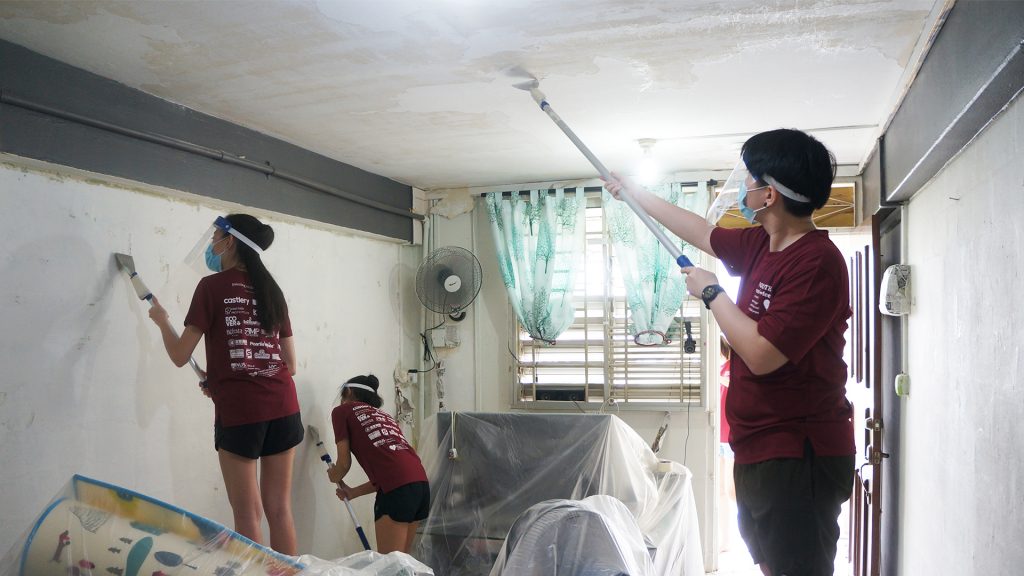NUS students do good to wrap up 2020
December 28, 2020

2020 has been a year of disruption, with COVID-19 posing unprecedented challenges to our way of life.
It has also been a year where society has needed the most support. NUS students have continued to live up to the spirit of giving this holiday season by contributing to the community in various ways — including a new online donation platform and giving needy households a fresh coat of paint.
Gift for Good
Adopting the concept of an online marketplace, the Developer Student Club, a student group comprising NUS students and alumni, launched Gift for Good — an online platform to galvanise in-kind donations. The platform connects individual donors with charity organisations, allowing donors to make in-kind donations seamlessly and efficiently.
Gift for Good users can donate items in just three simple steps: browse, chat and deliver. Users can browse through the request lists of charity organisations to find one that they can fulfil. Once they have done so, they can start an online chat with a staff member of the charity organisation that they are donating to, and coordinate the delivery of the item.
Year 3 NUS Arts and Social Sciences student Yeo Qin-Liang, who is the Business Lead of Gift for Good, shared, “The platform streamlines the process of registering and requesting for in-kind donations for charity organisations. It also actively engages and retains donors, so that charity organisations can more easily obtain the items that they require.”
He added, “In doing so, we hope to create a more generous Singapore.”
Gift for Good has received an endorsement from the National Volunteer and Philanthropy Centre. Some 25 charity organisations are also already on board the platform to help their beneficiaries obtain the items they need.
The Children’s Aid Society is one of the charity organisations on the platform. “Gift for Good has a meaningful mission of connecting communities and providing a seamless and inclusive platform for coordinating in-kind donations. As a multi-centre social service agency, we have varied in-kind donations needs and we look forward to connecting with donors via Gift for Good to fulfil the needs of our beneficiaries and clients as best as possible,” said its spokesperson.

Project Paint-A-Home
The NUS Students’ Community Service Club (CSC), on the other hand, overcame huge logistical challenges and persevered with its annual Project Paint-A-Home to give a fresh coat of paint to elderly and low income households, and improve their living conditions.
“The planning process has been very tedious this year as there were a lot of uncertainties,” said Year 2 NUS Science student Quek Yong Kang, who is one of the Project Directors for Project Paint-A-Home. “An average of eight volunteers were assigned to paint a unit in previous years. This year, we had to make do with painting smaller homes since we could only have five volunteers painting a unit, to adhere to COVID-19 Safe Management Measures,” he explained.
Despite the challenges, the CSC successfully recruited 145 volunteers who painted 28 units, including one-room and two-room units, over two weekends in December. The Thong Keng Senior Activity Centre and Care Corner Senior Activity Centre supported the outreach and linked the CSC up with the households.
Year 4 NUS Arts and Social Sciences student So Hoi Kay shared her volunteering experience, "Going down to the beneficiaries’ houses and speaking to them has led me to realise how much more can and needs to be done for the underprivileged in Singapore. Although painting their houses is just a minor commitment on our end, I hope that our efforts, in however small a way, will be able to brighten and improve their lives. The smiles and appreciation of the beneficiaries at the end of the day took away the tiredness of volunteering and I am glad that everyone’s collective hard work has paid off.”
To wrap up the year, the Rotaract Club of NUS will be delivering meals to the elderly on 29 December, as part of TOUCH Community Services’ Meals-on-Wheels programme.
This story first appeared in NUSnews on 22 December 2020.

